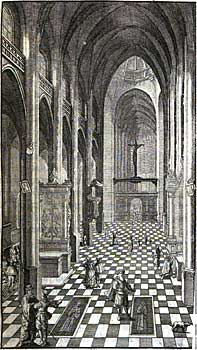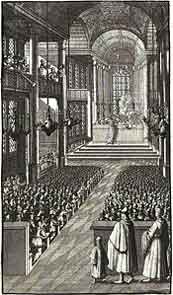|
|
|
|

Excerpt from Utopia, Book 2.
[Temples and Religious Services in Utopia]
They have magnificent temples, nobly built and spacious, which is the more necessary as they have so few of them. These are somewhat dark within, which proceeds from no error in the building, but is done with design. For their priests are of opinion, that too much light dissipates the thoughts, while a more moderate degree concentrates the mind and raises devotion.
Though there be many different forms of religion among them, all agree in the main point of worshipping the divine essence. Therefore there is nothing to be seen or heard in their temples, in which the several persuasions among them may not agree. For every sect performs the rites peculiar to it in their private houses, and there is nothing in the public worship which contradicts their peculiarities. There are no images of God in their temples, therefore every one may represent him to his thoughts in his own way; nor do they use for him any other name than Mithras, their term in common for the divine essence, whatever otherwise they think of it; nor have they any forms of prayer, but such as every one of them may use without prejudice to his private opinion.
They meet in their temples on the eve of the festival concluding a month or year, and before breaking their fast, thank God for their prosperity during that period. The next day they meet there again early, to pray for the same prosperity during the period on which they then enter. Before they go to the temple, wives and children kneel to their husbands and parents, confess every thing in which they have erred or failed in their duty, and beg pardon for it. Thus all petty dissatisfactions in families are removed, and they can offer their devotions with serenity and pureness of mind. For they hold it a great impiety to enter upon them with disturbed thoughts, or with a consciousness of bearing hatred or anger to any one; and that they should become liable to severe punishment, if they presumed to offer sacrifices without cleansing their hearts and reconciling every difference.
In the temples the sexes are separated, the men going to the right and the women to the left. Males as well as females place themselves before the master or mistress of the family to which they belong, that those who have the government of them at home may see their deportment in public. They mingle the young with the old, lest, being apart, they might trifle away that time in which they ought to form in themselves that religious awe of the Supreme Being, which is the strongest and nearly the sole incitement to virtue.
 They offer no living creature in sacrifice; not thinking it suitable to the Divine Being, by whose bounty these creatures have their lives, to take pleasure in their deaths, or the offering their blood. They burn incense and other sweet odours, and burn a number of waxen lights during their worship. And this, not from any imagination that such oblations can add any thing to the Divine Nature, which even prayers cannot, but it is a harmless and pure mode of worship; and these sweet savours and lights, with some other ceremonies, by a secret and unaccountable virtue, elevate man's soul, and inspire him with energy and cheerfulness during divine worship.
They offer no living creature in sacrifice; not thinking it suitable to the Divine Being, by whose bounty these creatures have their lives, to take pleasure in their deaths, or the offering their blood. They burn incense and other sweet odours, and burn a number of waxen lights during their worship. And this, not from any imagination that such oblations can add any thing to the Divine Nature, which even prayers cannot, but it is a harmless and pure mode of worship; and these sweet savours and lights, with some other ceremonies, by a secret and unaccountable virtue, elevate man's soul, and inspire him with energy and cheerfulness during divine worship.
The people appear in the temples in white garments, but the vestments of the priests are party-coloured, and the work as well as the colours are highly curious. They are made of no rich materials, for neither are they embroidered, nor beset with precious stones; but they are composed of the plumage of birds, with such art, that the real value of them exceedeth the costliest materials. They say, that in the disposition of these plumes, some dark mysteries are represented, which descend in a secret tradition among their priests; being a kind of hieroglyphic, reminding them of the blessings derived from God, and of their duty to him and their neighbour.
When the priest appears in these garments, they all fall prostrate to the ground with such reverence and silence, that a spectator cannot but be struck, as if it was an effect of some supernatural appearance. After being for some time in this posture, they all stand up, on a sign given by the priest, and sing hymns to the honour of God, musical instruments playing the while. These are of a form totally differing from those used among us; many are much sweeter, others not to be compared to ours. Yet in one thing they very much excel us. All their music, vocal as well as instrumental, imitates and expresses the passions. It is so well adapted to every occasion, that, be the subject deprecation, gladness, soothing, trouble, mourning, or anger, the music gives such a lively impression of what is represented, as wonderfully to affect and kindle the passions, and work the sentiments deeply into the hearts of the hearers.
This done, priests and people offer very solemn prayers to God in a set form of words; which are so composed, that whatever is pronounced by the whole assembly may be applied by any individual to himself. In these they acknowledge God to be the author and governor of the world, and the fountain of all the good they receive; they therefore offer him their thanksgiving. In particular, they bless him that they are born under the happiest government in the world, and are of a religious persuasion which they hope is the truest of all others. Be they mistaken, and there is a better government, or a religion more acceptable to him, they implore his goodness to let them know it; vowing that they resolve to follow him whithersoever he leadeth. But if their government be the best and their religion the truest, they pray that he may strengthen them therein, and bring all the world to the same rules of life and the same opinions of himself; unless, in his unsearchable wisdom, he be pleased with a variety of religions.
Then they pray that God may give them an easy passage at last to himself. They presume not to limit how early or late it should be; but if a wish may be formed, without derogating from his supreme authority, they desire to be quickly delivered and taken to him, though by the most terrible death, rather than to be long detained from seeing him by the most prosperous life. This prayer ended, they all fall down again to the ground, and after a short pause rise, go home to dinner, and spend the rest of the day in diversion or military exercise.
Cayley, Arthur, the Younger, ed. Memoirs of Sir Thomas More, &c.. Vol II.
London: Cadell and Davis, 1808. 136-140.
 |
to the Works of Sir Thomas More |
Site copyright ©1996-2018 Anniina Jokinen. All
Rights Reserved.
Created by Anniina Jokinen
on June 8, 2009. Last updated December 11, 2018.
|
|
The Tudors
King Henry VII
Elizabeth of York
King Henry VIII
Queen Catherine of Aragon
Queen Anne Boleyn
Queen Jane Seymour
Queen Anne of Cleves
Queen Catherine Howard
Queen Katherine Parr
King Edward VI
Queen Mary I
Queen Elizabeth I
Henry Fitzroy, Duke of Richmond
Renaissance English Writers
Bishop John Fisher
William Tyndale
Sir Thomas More
John Heywood
Thomas Sackville
Nicholas Udall
John Skelton
Sir Thomas Wyatt
Henry Howard
Hugh Latimer
Thomas Cranmer
Roger Ascham
Sir Thomas Hoby
John Foxe
George Gascoigne
John Lyly
Thomas Nashe
Sir Philip Sidney
Edmund Spenser
Richard Hooker
Robert Southwell
Robert Greene
George Peele
Thomas Kyd
Edward de Vere
Christopher Marlowe
Anthony Munday
Sir Walter Ralegh
Thomas Hariot
Thomas Campion
Mary Sidney Herbert
Sir John Davies
Samuel Daniel
Michael Drayton
Fulke Greville
Emilia Lanyer
William Shakespeare
Persons of Interest
Cardinal Thomas Wolsey
Archbishop Thomas Cranmer
Thomas Cromwell
John Fisher, Bishop of Rochester
Cardinal Lorenzo Campeggio
Cardinal Reginald Pole
Stephen Gardiner, Bishop of Winchester
William Tyndale
Pico della Mirandola
Desiderius Erasmus
Christopher Saint-German
Thomas Linacre
William Grocyn
Hugh Latimer
Elizabeth Barton, the Nun of Kent
For more, visit Encyclopedia
Historical Events
Field of the Cloth of Gold, 1520
Pilgrimage of Grace, 1536
The Babington Plot, 1586
The Spanish Armada, 1588
Government
Oath of Supremacy
The Act of Supremacy, 1534
The First Act of Succession, 1534
The Third Act of Succession, 1544
The Ten Articles, 1536
The Six Articles, 1539
The Second Statute of Repeal, 1555
Images of London:
London in the time of Henry VII. MS. Roy. 16 F. ii.
London, 1510, earliest view in print
Map of England from Saxton's Descriptio Angliae, 1579
Location Map of Elizabethan London
Plan of the Bankside, Southwark, in Shakespeare's time
Detail of Norden's Map of the Bankside, 1593
Bull and Bear Baiting Rings from the Agas Map (1569-1590, pub. 1631)
Sketch of the Swan Theatre, c. 1596
Westminster in the Seventeenth Century, by Hollar
Visscher's Panoramic View of London, 1616. COLOR
For more, visit Encyclopedia
|
|